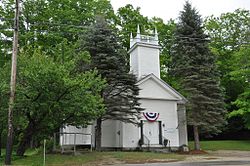South Danbury Christian Church
South Danbury Christian Church | |
 | |
| Location | 675 US 4, Danbury, New Hampshire |
|---|---|
| Coordinates | 43°28′58″N 71°53′12″W / 43.48278°N 71.88667°W |
| Area | 0.3 acres (0.12 ha) |
| Built | 1867 |
| Architect | Woodbury, John |
| NRHP reference No. | 85001191[1] |
| Added to NRHP | June 06, 1985 |
South Danbury Christian Church is a historic church at 675 US 4 in Danbury, New Hampshire. Built in 1867, it is a little-altered and well-preserved example of a rural vernacular church. The building was listed on the National Register of Historic Places in 1985.[1]
Description and history
The South Danbury Christian Church is located in the rural village of South Danbury, on the east side of US 4 just north of its junction with Challenge Hill Road. It is a single-story wood-frame structure, with a gabled roof and clapboarded exterior. A gabled entry pavilion projects from the front facade, which is unadorned except for the entry and pedimented gable. The entry is a double-leaf door, flanked by sidelight windows and framed by simple moulding. Astride the main block and entry pavilion, a single-stage square tower rises to a flat top with corner pinnacles and a low balustrade. The interior is simply appointed, with carpeted floors, plaster walls with wide board wainscoting, and a pressed metal ceiling.[2]
The building was constructed in 1867 by the local congregational society, which had been established the previous year. It was built by a local contractor, funds raised by the sale of pews. It has undergone relatively little exterior modification since. It has limited ornamentation, and is a good example of a rural vernacular 19th century church building. The only exterior changes of note are the replacement of the roof (1974), and the addition of electric lighting and a handrail. Interior changes were made around the turn of the 20th century, most of which are not detailed in church records.[2]
See also
References
- ^ a b "National Register Information System". National Register of Historic Places. National Park Service. March 13, 2009.
- ^ a b "NRHP nomination for South Danbury Christian Church". National Park Service. Retrieved 2014-03-13.



